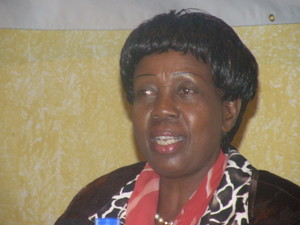CAADP Forum Calls For Scale Up of Investment in Agriculture
 By Zachary Ochieng
By Zachary Ochieng
YAOUNDE--The 7th Comprehensive Africa Agriculture Development Programme (CAADP) Partnership Platform meeting came to a close in Yaounde with a call on AU member states to increase funding for agriculture to boost food security and reduce poverty levels on the continent. A communiqué issued at the end of the meeting urged for the prioritization of the agricultural sector given that it is the main employer of the youth and women in Africa.
“Harnessing the energies of these segments of the society requires concerted efforts aimed at guaranteeing access to land and financial resources, among others. Decent rural employment considerations focusing on women and the youth are central for the CAADP implementation process”, the communiqué read in part.
It is worth noting that the success achieved thus far in the implementation of the CAADP agenda could not have been possible without the support of development partners. It is against this background that the meeting lauded their role, noting that it was an indication of a follow up to their commitments to CAADP-aligned investment plans. That notwithstanding, the meeting urged development partners to work towards ensuring adequate, timely and more predictable financing to country-led investment plans.
In her closing remarks, AU Commissioner for Rural Economy and Agriculture Tumusiime Rhoda Peace underscored the need for increased mutual accountability structures and processes in Africa, which, however, were already evident in a number of countries.
“I am pleased to note that the meeting gave particular attention to deepening mutual accountability for results and resources at all levels. We should especially ensure that mutual accountability is grounded in domestic accountability”, said Ms Rhoda Peace.
However, the AU Commissioner noted that despite the success of the meeting, a number of challenges still needed to be addressed. Key among them was to ensure that the standards and country orientations are kept up in future CAADP meetings, and to take forward the letter and spirit of what has been undertaken to move Africa’s agriculture, food and nutrition agenda to greater heights.
She reaffirmed the commitment of the AU Commission to continue to take leadership in collaboration with the NEPAD Planning and Coordinating Agency (NPCA), other pan-African institutions and partners, in keeping up the momentum and pursuing the mutual accountability agenda vigorously in the course of implementing CAADP.
Ms Elizabeth Atangana, Executive Secretary of Africa farmers’ organization said CAADP should continue to be an Africa-led initiative, bringing together governments, civil society organizations and the private sector. She asked for continued technical support to farmers, with women and the youth being given priority.
“I appeal to governments to promote conducive environments to ensure that the 10 per cent CAADP target is met. This is why farmers demand more space in future CAADP meetings”, said Ms Atangana.
Speaking on behalf of the development partners, Ms Julie Howard from USAID assured the meeting of their continued support in capacity building of national and regional CAADP plans to ensure that the plans were translated into actions.
The three day forum, held from March 23-25 comes at a time when global dialogue is focused on agricultural performance, food security and climate change. The meeting—held under the theme Mutual accountability in the formulation and implementation of country CAADP investment plans--- brought together 260 participants from 27 AU member states, including representatives from the African Union Commission, the NEPAD Agency, farmers’ organizations, regional economic communities and development partners.
Endorsed by the African Union and NEPAD in 2003, CAADP is an Africa-owned and led initiative and framework to rationalize and revitalize African agriculture for economic growth and lasting poverty reduction results. Under the Maputo Declaration of 2003, AU heads of state and government committed to allocate at least 10 per cent of their national budgets to agriculture. Twenty five countries have so far signed the CAADP compact.
The forum couldn’t have come at a better time. Decades of lagging agricultural productivity have resulted in increased numbers of Africans living below the poverty line from 150 million in 1980 to approximately 300 million today. The continent’s per capita agricultural productivity remains the lowest in the world. About 200 million people are undernourished and 33 million children go to sleep hungry every night.



